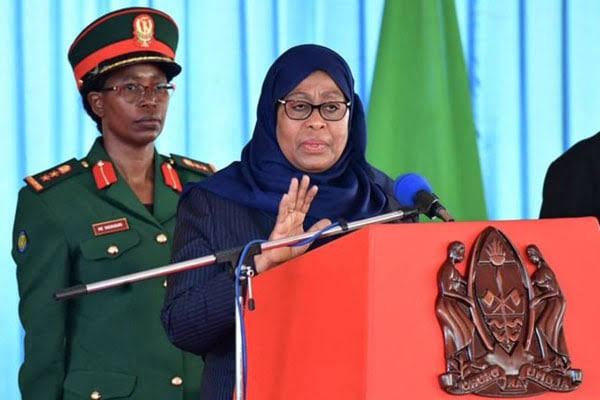La Tanzanie abandonne le swahili comme langue de l'école secondaire
Faith Nyasuguta ("Africa Equity Media")

La consternante nouvelle vient de tomber : la Tanzanie, pionnière dans l'enseignement de la langue swahili, vient de faire brusquement machine arrière. C'est l'anglais qui, désormais, redevient la langue première à l'école secondaire.
"The Queen's English" (l'Anglais de la Reine), précise le communiqué gouvernemental, les autorités tanzaniennes ne sachant apparemment pas qu'Elisabeth II est décédé...
TANZANIA DUMPS KISWAHILI IN SECONDARY SCHOOLS DESPITE PUSH TO MAKE IT AFRICA’S LINGUA FRANCA
Tanzanian schools have begun, this month, to adopt English as the compulsory medium of instruction.
The directive was issued by Benjamin Oganga, an officer attached to the Ministry of Education.
“We’ve banned the use of Swahili in all our secondary schools. We need to ensure our students understand and are able to use English in accordance with the policies of Education,” he said.
The official expressed optimism the move will help students express themselves in English.
The Tanzanian syllabus is predominantly in the Swahili language where even subjects such as Physics, Biology and Chemistry are taught in the language.
Until this decision, English was taught in Tanzanian schools as an optional language.

/GEC/
Assistant Director for Secondary Education in the President’s Office Benjamin Oganga said the unprecedented move is aimed at ensuring students are able to express themselves in the Queen’s language.
The total number of Swahili speakers globally varies widely, but estimates range from 60 million to over 150 million people.
This number comprises both native and second-language speakers where around five to fifteen million people speak Swahili as their first language with Tanzania accounting for the largest number at about 9 per cent.
The adoption of English as a compulsory medium of instruction in Tanzanian schools is set to solve pre-existing communication challenges with English-speaking countries. Still, the move has sparked outrage from some social media users.
SWAHILI’S BID TO BECOME AFRICA’S LANGUAGE?
*BACKGROUND*
Swahili, which originated in East Africa, is one of the world’s 10 most widely spoken languages and, as Priya Sippy wrote, there is a renewed push for it to become the continent’s lingua franca.
“It’s high time we move from the coloniser’s language.”
Recently, the African Union (AU) adopted Swahili as an official working language.
It is also the official language of the East African Community (EAC), which DR Congo recently joinEd.
In 2019, Swahili became the only African language to be recognised by the Southern African Development Community (SADC). Shortly after, it was introduced in classrooms across South Africa and Botswana.
Most recently, Ethiopia’s Addis Ababa University announced it would start teaching Swahili.
Some linguists predicted that Swahili’s reach in Africa will continue to expand.

Tanzanian President Samia Suluhu /The East African/
Tom Jelpke, a researcher of Swahili at London’s School of Oriental and African Studies, argues that as connections grow across the continent, people will want a common way to communicate.
He believes that its closeness to other languages in east and central Africa will cement its position there. But beyond those regions there may also be an ideological element.
“Swahili… comes [with] a sense of ownership,” says Ally Khalfan, a lecturer at the State University of Zanzibar, echoing the views of Ms Lankai. “It is about our property and our identity as Africans.”
- Se connecter ou s'inscrire pour publier un commentaire
- 122 vues
Connexion utilisateur
Dans la même rubrique
16/02/2026 - 18:29
05/02/2026 - 21:16
Robert Saé (responsable aux affaires extérieures du CNCP)
03/02/2026 - 20:06
Commentaires récents
Derrière la diabolisation de Mélenchon, la haine du "bougnoule"
Yug , yug ou ...yug ?
yug
27/02/2026 - 17:26
Ouais assez marrante cette évocation des sens du mot yug ( à condition qu'elle soit vraie et ne s Lire la suite
Derrière la diabolisation de Mélenchon, la haine du "bougnoule"
Yug-hitler= intello?
@Lidé
27/02/2026 - 17:19
Albè je crois que yug-hitler va trouver de mots équivalents pour purifier la langue françoise, de Lire la suite
Derrière la diabolisation de Mélenchon, la haine du "bougnoule"
Yug-hitler= intello?
@Lidé
27/02/2026 - 17:18
Albè je crois que yug-hitler va trouver de mots équivalents pour purifier la langue françoise, de Lire la suite
L’ATTAQUE RUSSE EST CONDAMNABLE MEME SI LA POLITIQUE IMPERIALE DE L’OCCIDENT EN EST LA CAUSE
COMMENTATEUR AU BOIS DORMANT ?
Albè
27/02/2026 - 15:13
Cet article date d'il y a...4 ans. De 2022 donc ! Lire la suite
Derrière la diabolisation de Mélenchon, la haine du "bougnoule"
PETITE ERREUR...
Albè
27/02/2026 - 15:10
Cet article comporte une petite erreur : les mots gaulois qui sont restés en français ne sont pas Lire la suite
Top 5 des articles
Aujourd'hui :
- Louis Boutrin propose un vrai renouveau pour le Carbet
- Municipales au Prêcheur : une bande de bouffons
- Derrière la diabolisation de Mélenchon, la haine du "bougnoule"
- Martinique, un étrange parfum de macoutisme
- Barbès créole blues
Depuis toujours :
- Tous les présidents et premiers ministres de la Caraïbe sont vaccinés
- L'intolérable appauvrissement intellectuel et culturel de la Guadeloupe et dans une moindre mesure de la Martinique !
- LETTRE OUVERTE AU 31ème PREFET FRANCAIS DE MARTINIQUE
- L'arrière-grand-père maternel de Joan Bardella était...algérien
- Les triplement vaccinés contre le covid ne bandent plus





